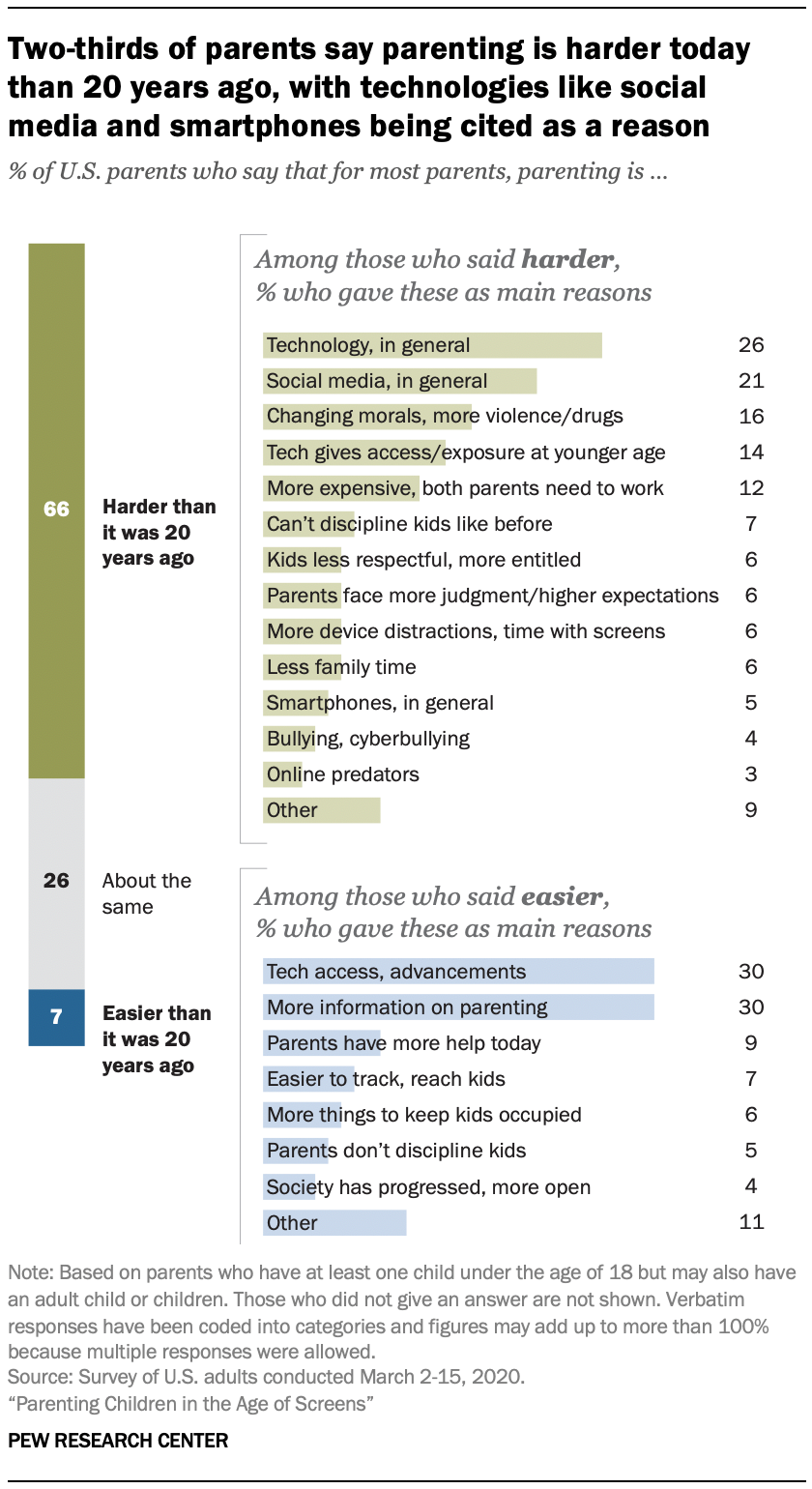
In today’s digitally connected world, parents have to manage their own relationship with the internet and mobile devices, along with managing their children’s use of and exposure to the same technology. This brings with it a host of both benefits and challenges.
Parents, which includes those who have at least one child under the age of 18 but who may also have adult children, are far more likely to say that parenting is harder today than it was two decades ago than believe the opposite is true. Two-thirds of these parents say that parenting today is harder than it was 20 years ago for most parents. Just 7% say it is easier, and 26% say it is about the same.
The belief that parenting is harder today than in the past is common across demographic groups, but there are some differences by age. Older parents are more likely to say that raising children has grown more difficult, with 71% of parents 50 and older saying parenting is harder, compared with smaller shares of parents ages 18 to 49 (65%).
The survey also asked parents to explain, in their own words, why they believe parenting is easier or harder today for most parents than it was 20 years ago.
Among respondents who believe that parenting is harder today, 26% cite technology. Many of these responses mention the increased use of technology and the rapid changes in technology that can be hard for parents to keep up with. They also mention how these technologies may be changing the behaviors and experiences of children. (Responses are lightly edited for spelling, style and readability.)
“Parents don’t know how to handle the technology.” – Man, age 43
“Technology has taught kids instant gratification and no patience.” – Man, age 49
“We have so much technology today that was not available 20 years ago. Social media, reality TV shows, video games have really changed our society and how we interact with each other.” – Woman, age 49
“There’s too much technology. Kids are addicted. They don’t go outside, they don’t hang out with friends, they are getting overweight due to lack of exercise and poor diet.” – Man, age 46
Another 21% of these respondents mentioned social media and the potential negative impact it may be having on children.
“I think that social media is harmful to kids and their self-concepts and self-images. It’s difficult to combat the messages that [they] are getting ALL THE TIME from the outside world. Being a teen is more difficult than it was even 10 years ago, and much more difficult than it was 30 years ago. Parenting through all of the obstacles is really challenging.” – Woman, age 51
“Social media, more information available about everybody. Fear of strangers communicating with kids via internet.” – Man, age 43
Other responses cited the changing morals of society. These responses often noted that society is worse off today than in the past, with more violence and more drugs.
“Kids are doing more drugs and drinking. Less religion in people’s lives.” – Woman, age 48
“Moral slide in culture at large creates a hostile environment for parents who are trying to instill values in their children.” – Man, age 53
“It’s a different world, more violence, more sex trafficking, more crime, more dangers.” – Woman, age 41
Some 14% of parents that view parenting as a harder endeavor today than in the past also note that they believe technology gives kids access and exposure to things at a young age, which in turn makes parenting harder, while some parents mention financial constraints, including the need for both parents to work in order to raise a family.
“So much access to information with electronic devices. Information overload gives kids too many ideas and can adversely affect their behavior.” – Man, age 45
“While the internet can be wonderful, it also makes inappropriate material far too accessible for children and also makes them vulnerable to predators. Parents must stay engaged with technology to monitor use in efforts to protect children more than previous generations.” – Woman, age 37
“Salaries have not kept up with cost of living increases and so most families are struggling to make ends meet and raise a child at the same time. Technology has also added new challenges.” – Man, age 36
“More families 20 years ago had two parents, and often one parent could care for the children full time. Now, many families are single parent or often both parents feel the need to work in order to make ends meet. The work/family time balance can be stressful now.” – Woman, age 31
Less commonly mentioned reasons center around not being able to discipline children in the same way as in the past, children being less respectful and more entitled, higher expectations on parents and more judgment, more device distractions and too much time with screens, and less family time.
In total, roughly half of parents (52%) who believe that parenting is harder today than it was 20 years ago cited technology in some way as a reason.
Parents who say parenting is easier today cite tech advancements, access to more information and advice
By contrast, a relatively small share of parents agree that parenting today is easier than two decades ago. When asked to explain why they thought parenting is easier now than in the past for most parents, the most commonly cited reasons revolve around advancement and access to technology, more information and advice for parents and the ease of keeping track of kids.
Some 30% of parents reference how technology has improved education and entertainment and made parents’ lives easier.
“Technology! Kids can play games for entertainment or education. It’s a great distraction when you need them to be home, but you have to cook. Also, kids with learning disabilities thrive with the help of devices.” – Woman, age 35
“People are better off today. Technology has advanced to make parenting, security and transportation easier.” – Man, age 34
“Technology helps and our kids are smarter and learn faster.” – Woman, age 38
Parents who mentioned that parenting is easier today due to more information being available for parents often noted the accessibility of resources on the internet and access to a broad range of sources.
“Many more resources are available for parents now than then. More books, more articles, better psychological services available, better understanding of what makes a good childhood, better everything.” – Man, age 35
“The information available to us to educate ourselves when it comes to a child’s development and what is best for them.” – Woman, age 24
“There [are] way more resources to guide and help new parents nowadays. Most of which are free and some for very low or reasonable prices.” – Man, age 31
“The internet information helps a lot with professional advice on child psychology and medical information.” – Woman, age 52
About one-in-ten parents (9%) who said parenting is easier today than it was 20 years ago say that parents have more help.
“There’s so much more help today, with everything.” – Woman, age 21
“More younger parents have their parents to help or leave their kids with.” – Woman, age 48
“More care options.” – Man, age 44
Another 7% of parents said that today, it is easier to keep track of and reach children.
“Due to today’s technology we can monitor and track our kid’s movements. Both physically and daily in school.” – Woman, age 42
“As a parent you can have better tabs on your child. You know how they are doing in school, you can track where they are and you can put better limits on what they can see and for how long.” – Man, age 42
Some 6% of parents also noted that there are more things to keep children occupied today compared with 20 years ago.
“We have more options to entertain, play and teach.” – Woman, age 32
“More diversions to keep kids entertained, they can also look up information at a moment’s notice that would have required a trip to the library. Internet was dial up then.” – Man, age 57
Fewer respondents mentioned that parents don’t discipline their kids in the same way and the role of parents has shifted (5%) and that society in general has progressed and is more open (4%).
Across all of the open-ended responses about why parenting is easier today than it was 20 years ago, 43% of respondents cited some form of technology.
Fathers are more likely than mothers to say they don’t spend enough time with their children
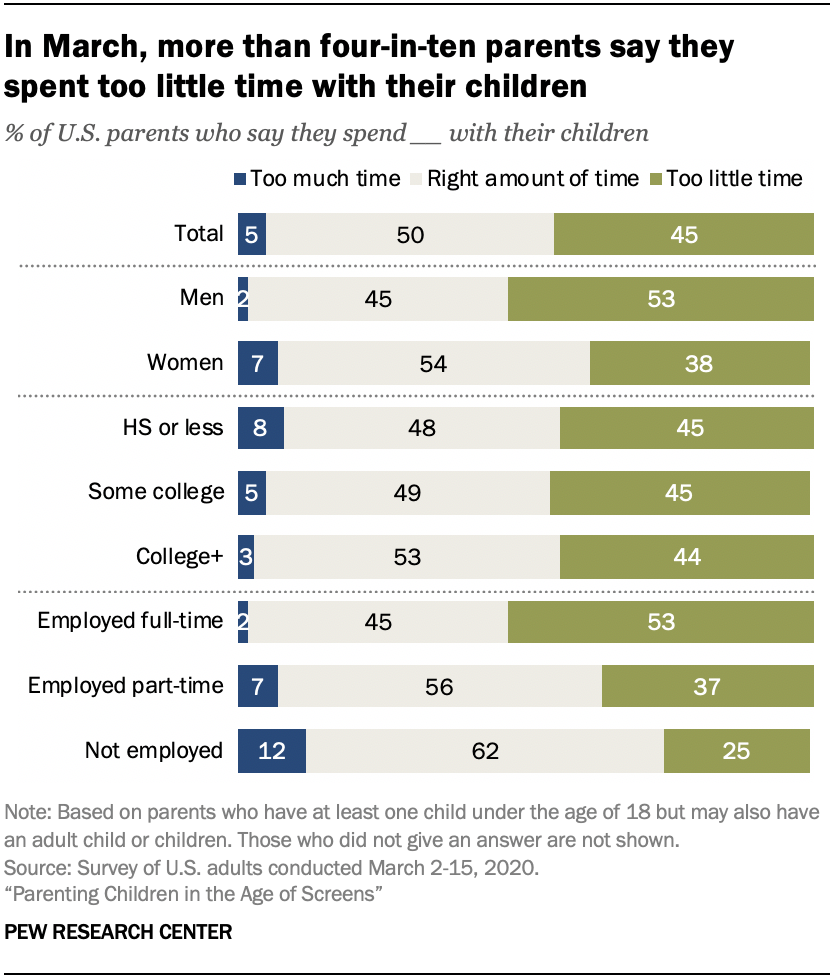
Parents of at least one child under the age of 18, but who may also have adult children, are far more likely to say they spend too little (45%) rather than too much time (5%) with their children, while half believe that they spend about the right amount of time with their kids, but whether parents believe they spend too much or not enough time with their children varies by gender, educational attainment and employment status. (It is worth noting this survey was fielding in March, prior to the COVID-19 outbreak in the U.S. that closed many schools and led to widespread shutdowns and stay-at-home orders throughout the country.)
About half of fathers overall (53%) say they spend too little time with their children, compared with 38% of mothers who say the same. Those who have a bachelor’s degree or higher (53%) are slightly more likely to say they spend the right amount of time with their children than those who have some college education or less (48%).
Parents who were employed full-time at the time of the survey were also more likely to report spending too little time with their children when compared with those who are either employed part-time or not employed.7
More than half of parents say they spend too much time on their smartphone
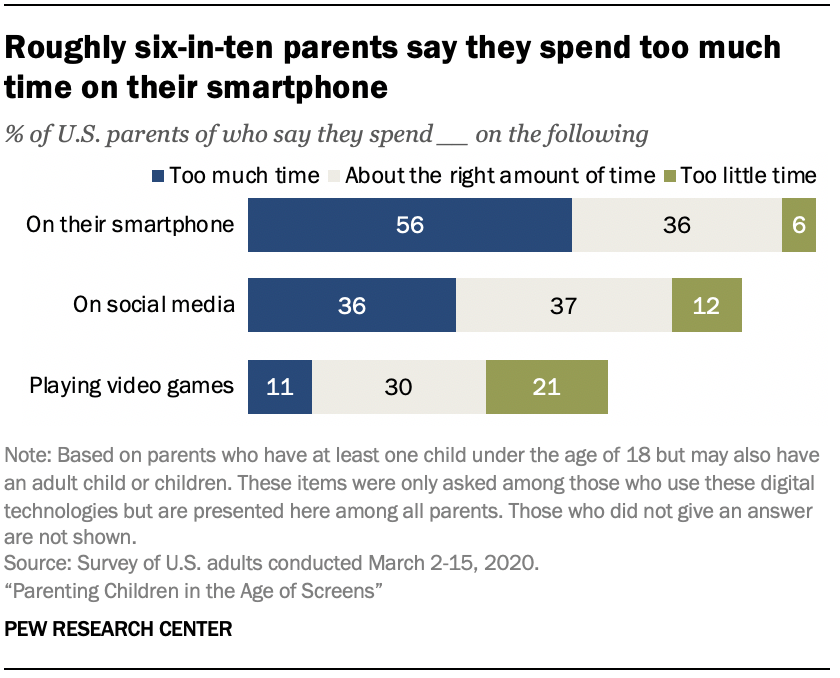
More than half of parents who have at least one child under the age of 18 (but who may also have adult children) say they spend too much time on their smartphone (56%), with smaller shares saying this about the amount of time they spend on social media (36%) or playing video games (11%).
Mothers (61%) are more likely than fathers (49%) to say they spend too much time on their smartphone, while white parents (60%) are also more likely than their Black (52%) and Hispanic (46%) counterparts to say they spend too much time on their phones.
Parents under the age of 50 are more likely than those 50 and older to report spending too much time on their smartphone. For instance, 65% of parents ages 18 to 29 and 58% of parents 30 to 49 say they spend too much time on their smartphone, compared with roughly one-third of parents over 50 (36%) who say the same.
There are also differences by education level. When it comes to saying they spend too much time on their smartphones, about six-in-ten parents who have some college education or higher say this, compared with 47% of parents who have a high school education or less.
Parents’ assessments of their social media use follow similar patterns, with parents who are women, white, younger and who have higher levels of educational attainment saying they spend too much time on these sites.
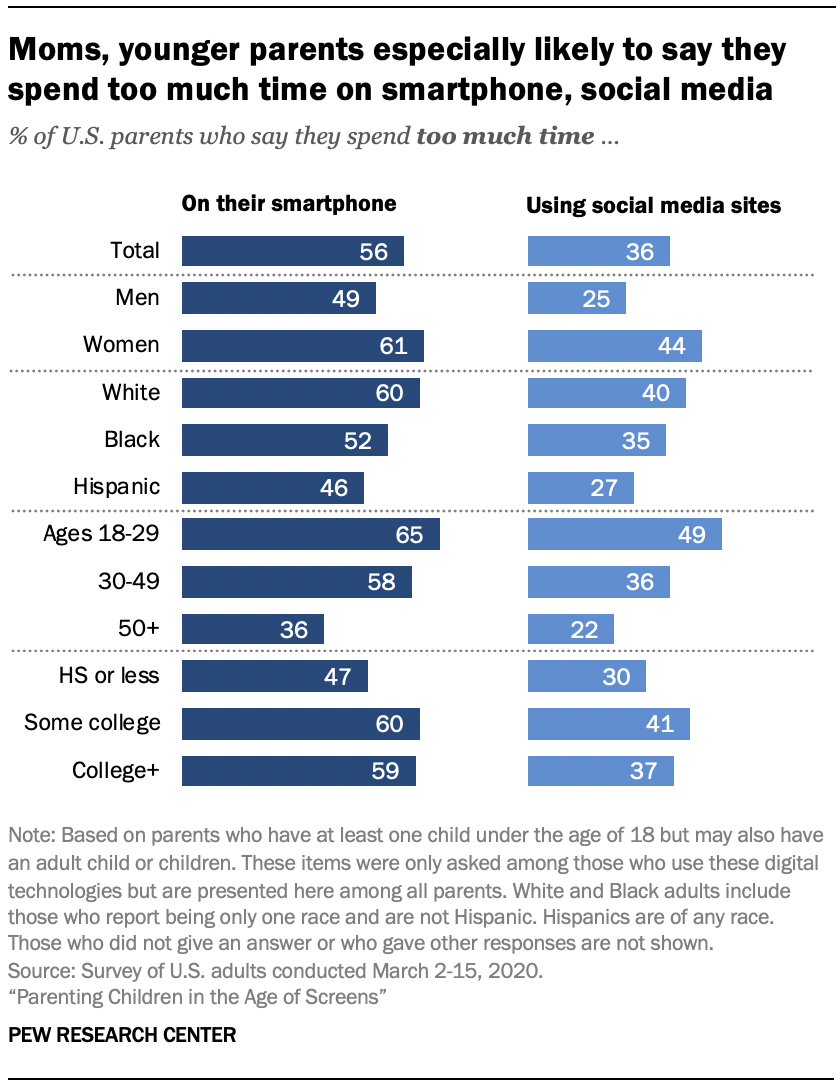
Large share of parents report being distracted by their phones while with their kids
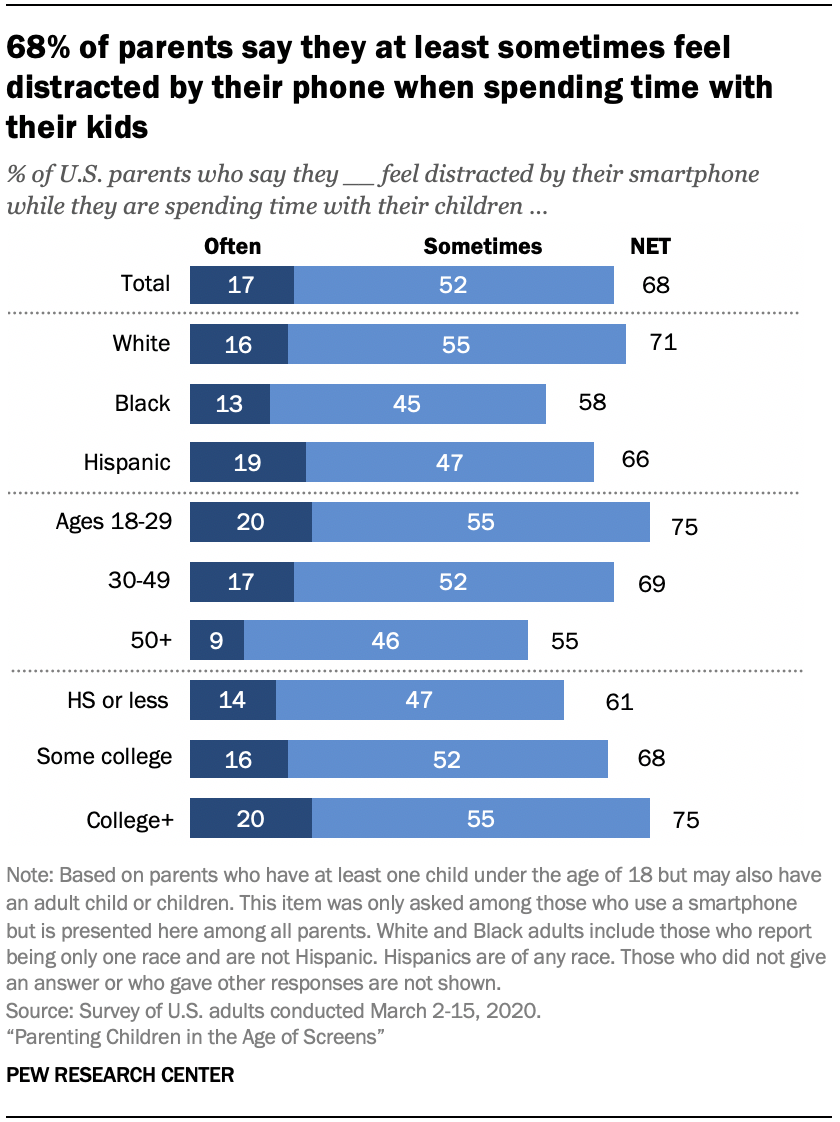
A majority of parents (68%) who have at least one minor child, but who may also have children over the age of 18, say that they at least sometimes feel distracted by their smartphone while they are spending time with their children, including 17% who say they feel this way often.
White parents (71%) are more likely than parents who are Black (58%) to say they are at least sometimes distracted by their phone when spending time with their children.
Age and educational attainment are also factors. Parents ages 18 to 49 are more likely than those 50 and older to say this often or sometimes occurs (70% vs. 55%). And while a majority of parents across educational levels say they face these distractions, college graduates are more likely than those with some college experience or with a high school diploma or less to say this.
‘Sharenting’: Most parents who use social media have posted things about their kids on social media; 76% say being able to easily share information with family and friends is a major reason why they post
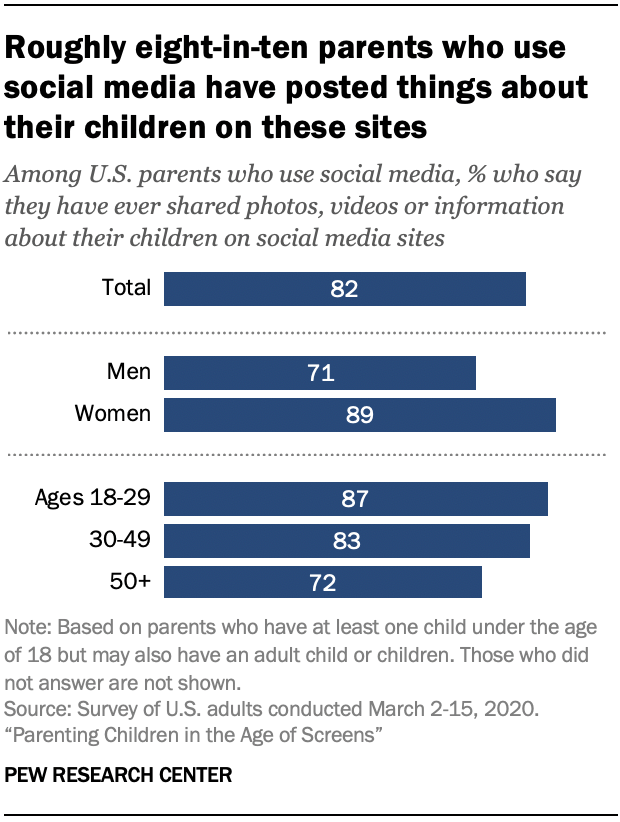
The phenomenon of parents posting and sharing photos and other things about their children on social media, sometimes referred to as “sharenting,” has been the subject of editorials and thought pieces in recent years. This survey explored several aspects of “sharenting” and finds that 82% of parents who use social media say they have posted photos, videos or other information about their children on these sites.
Among social media-using parents who have at least one minor child (but who may have an adult child or children), women are more likely than men to say they have done this (89% vs. 71%).
Younger social media-using parents – those between the ages of 18 and 49 – are also more likely to report that they have done this than are parents 50 and older who also use these sites.
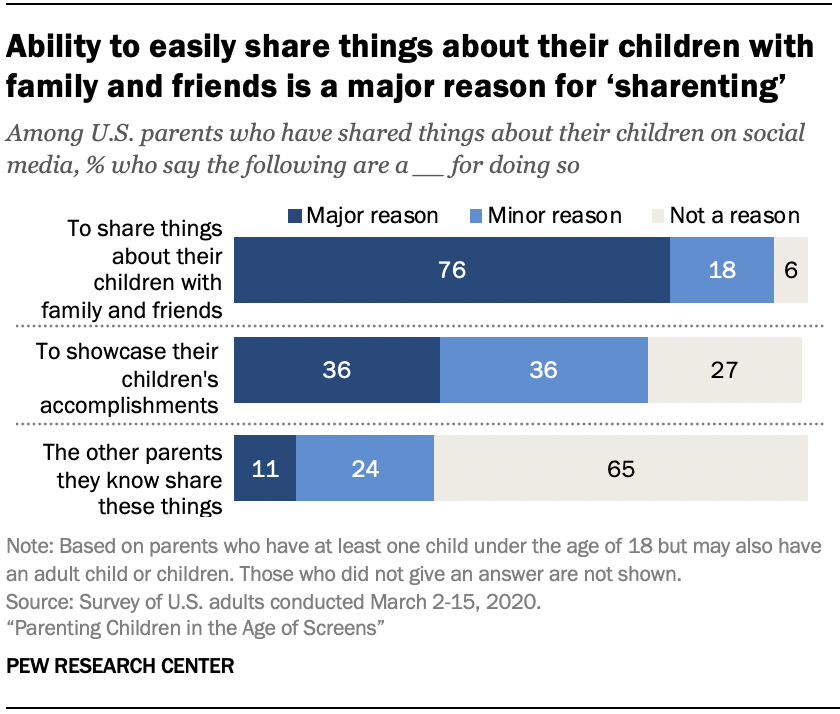
Fully 76% of parents who are sharers say that the ability to easily share things about their children with friends and family is a major reason for sharing, while smaller portions say showcasing their children’s accomplishments (36%) and sharing because other parents they know share these things (11%) are major reasons why they post things about their children on social media.
Parents’ reasons for posting this type of content vary by gender, race and ethnicity and educational level. For example, mothers who use social media and who share this information (78%) say that sharing things about their children with family and friends is a major reason for sharing on social media, compared with 72% of fathers who say the same. This trend carries across the other two reasons – showcasing children’s accomplishments and other parents they know sharing this type of information on social media – with mothers more than fathers saying these things are more of a major reason for sharing.
Reasons for sharing also vary by race and ethnicity. Among white parents who have shared things about their children on social media, easily sharing things about their children with friends and family is more of a reason for sharing than it is for Black parents; Hispanic parents are squarely in the middle. When showcasing their children’s accomplishments is considered, Black parents who use social media (50%) are more likely to say this is a major reason, compared with smaller shares of Hispanic (39%) or white parents (33%) who use these platforms.
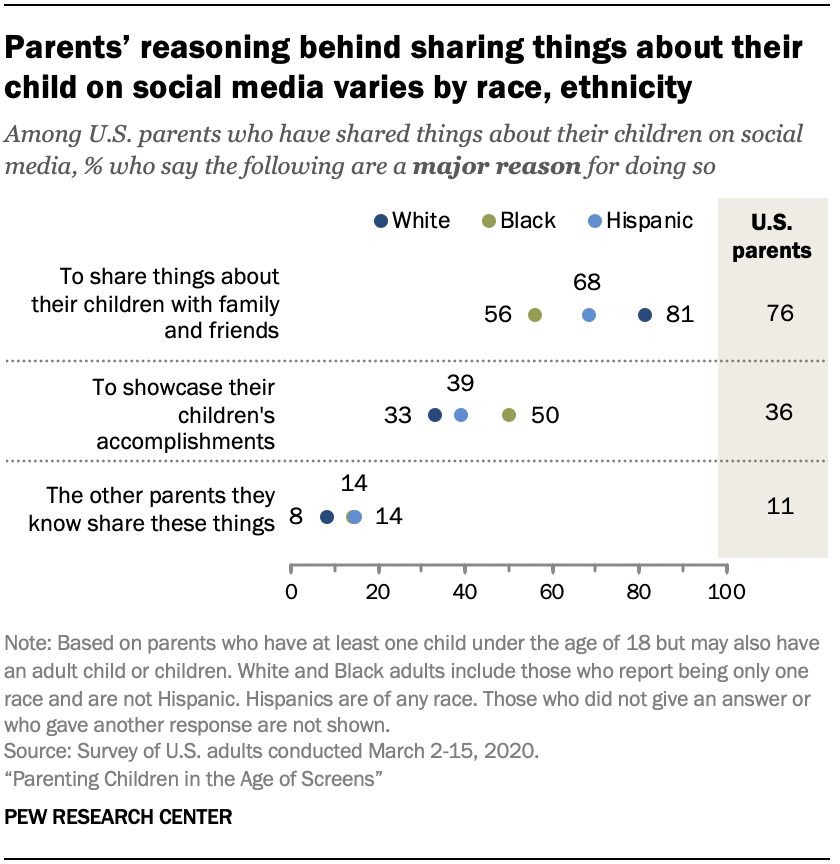
Education level is also related to the reasons parents share photos, videos and information about their children on social media. Parents with a bachelor’s degree or higher who have shared things about their children on social media (83%) say sharing things about their children with friends and family is a major reason they share, compared with smaller shares of those with a high school diploma or less (66%). However, social media-using parents who share things about their children on these sites and who have a high school diploma or less (44%) are more likely than those with a college education or higher (28%) to say showcasing their children’s accomplishments is a major reason they post about their children on social media.
18% of parents who use social media do not share things about their kids on these sites – with privacy-related issues being one the major reasons why they don’t
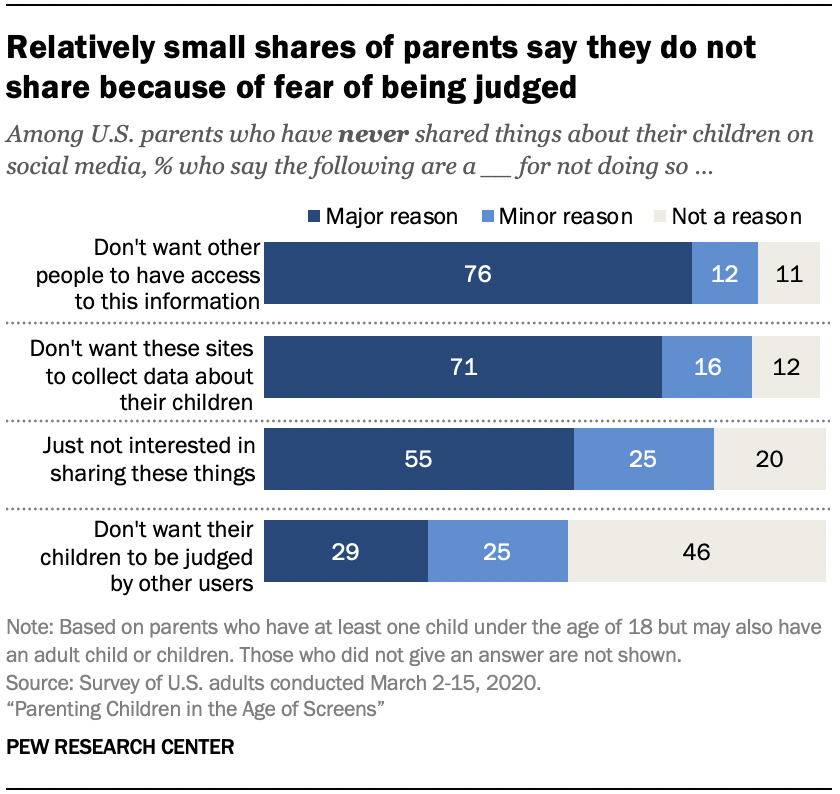
The 18% of non-sharing parents who use social media were asked about four potential reasons they might not want to share things about their children on social media. Majorities cited not wanting others to have access to such information (76%), not wanting social media sites to collect data about their children (71%) and simply not being interested in sharing these things (55%) as being a major reason for not sharing. Only about three-in ten parents who use social media but do not share these things (29%) said not wanting their children to be judged by other social media users was a major reason for not sharing.
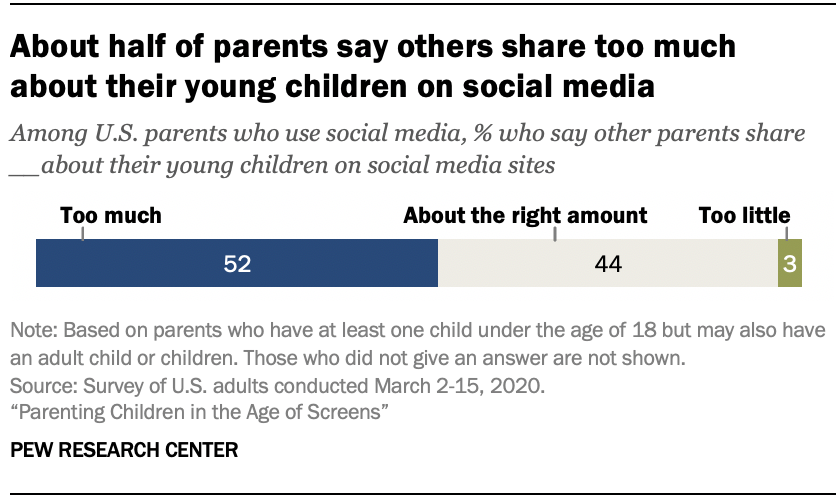
When thinking about other parents sharing photos, videos and information about their own children on social media, about half of social media-using parents (52%) say others share too much about their young children, with a slightly smaller share (44%) saying they share the right amount.
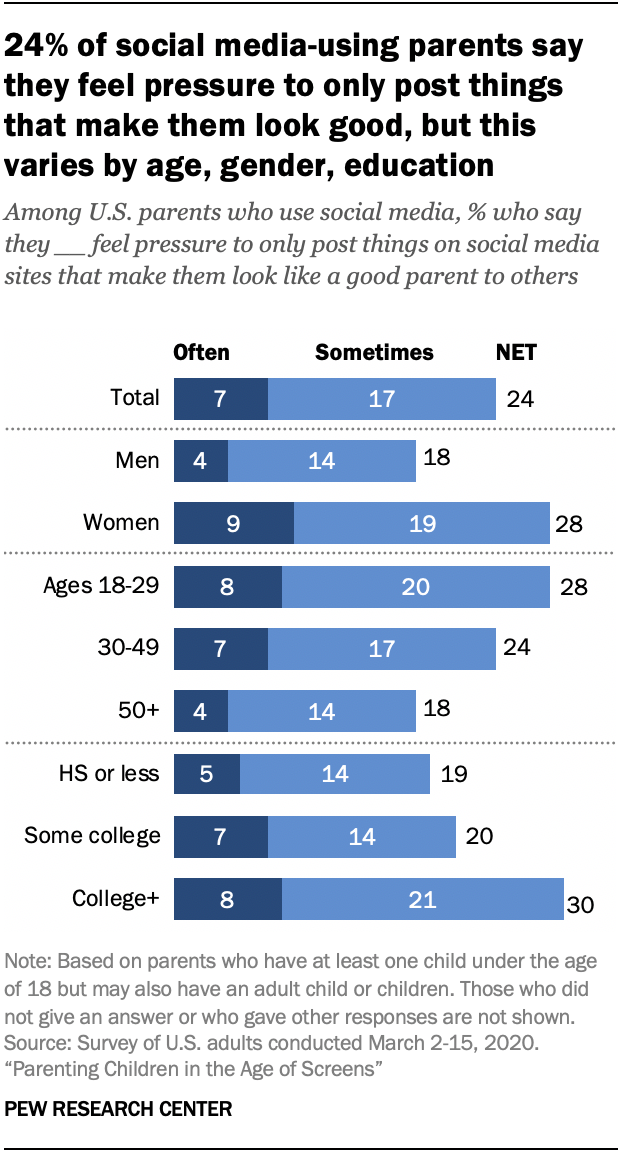
The majority of those who use social media say they rarely or never (76%) feel pressure to only post things that make them look like a good parent, with 54% of that share saying they never feel this pressure. About one-quarter of parents (24%) say they sometimes or often feel such pressure.
Among those who use social media, about three-in-ten mothers (28%) say they at least sometimes feel pressure to only post things that make them look like a good parent, compared with 18% of fathers who say the same. Younger parents (those 18 to 49) are also more likely to say they feel this pressure than parents 50 and older. There are also differences by parents’ educational level – with 30% of college graduates feeling pressure to only post things on social media that make them look like a good parent, compared with smaller shares of those with some college experience (20%) or a high school education or less (19%).
Those who say they do a fair or poor job as a parent (32%) are also more likely to say they feel this pressure when compared with those who rate themselves as very good or good parents (23%).
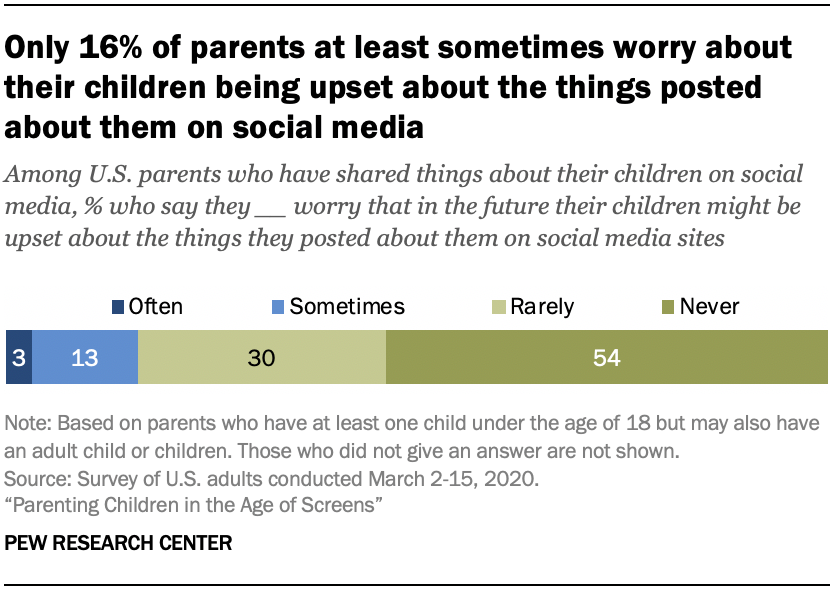
Some of the arguments against “sharenting” have focused on protecting children online. Other arguments have centered on worries about children’s ability to grant consent. The majority of parents who share photos, videos and information about their children on social media say they rarely or never (83%) worry that in the future their children might be upset about the things they posted about them on social media sites. Just 16% say they worry about this sometimes or often.
Roughly 60% of parents of a child under age 12 say they get screen time advice from doctors or other parents
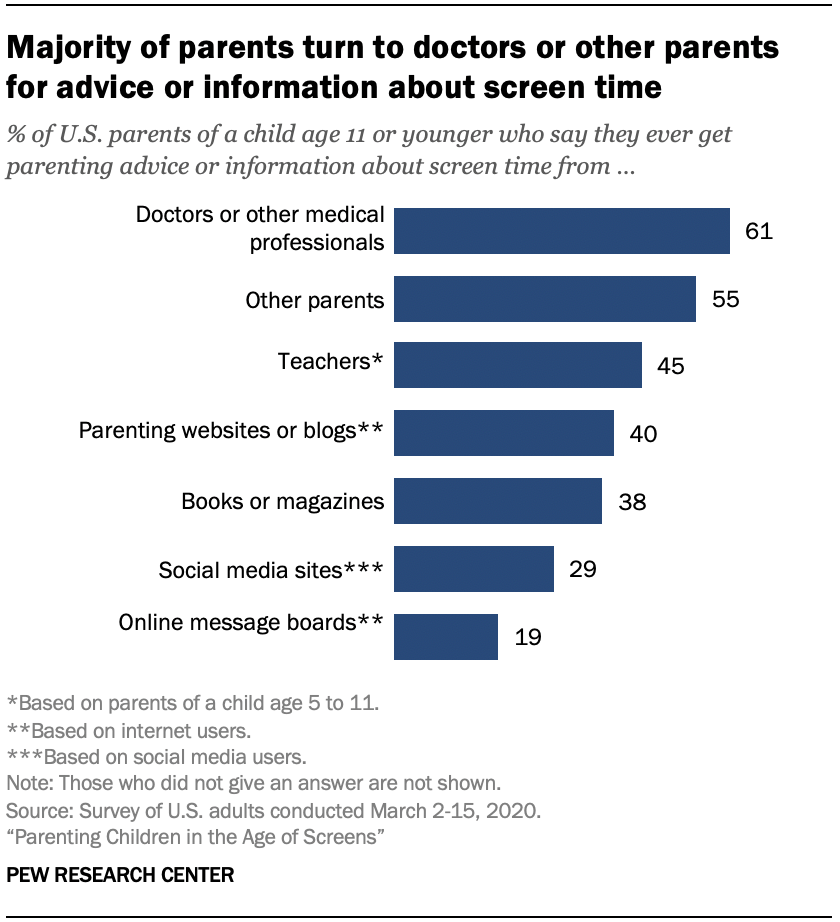
Majorities of parents of a child age 11 or younger say they ever get advice or information about screen time from doctors or other medical professionals (61%) or other parents (55%), with about four-in-ten consulting books or magazines (38%). Roughly half of parents of children ages 5 to 11 (45%) rely on teachers for this type of information and advice. Some parents who are internet and social media users turn to online resources and communities – with 40% of parents who use the internet getting advice from parenting websites or blogs, 29% of parents who use social media turning to social media sites and 19% of internet-using parents getting information from online message boards.
Getting advice and information about screen time varies by parents’ gender and level of education.
Mothers are more likely to say they get advice from nearly all of these sources. For instance, 67% of women say they ever get parenting advice or information about screen time from doctors or other medical professionals, compared with 53% of men. Women who use the internet are also more likely than men who use internet to consult parenting websites or blogs for screen time information and advice (46% vs. 32%).
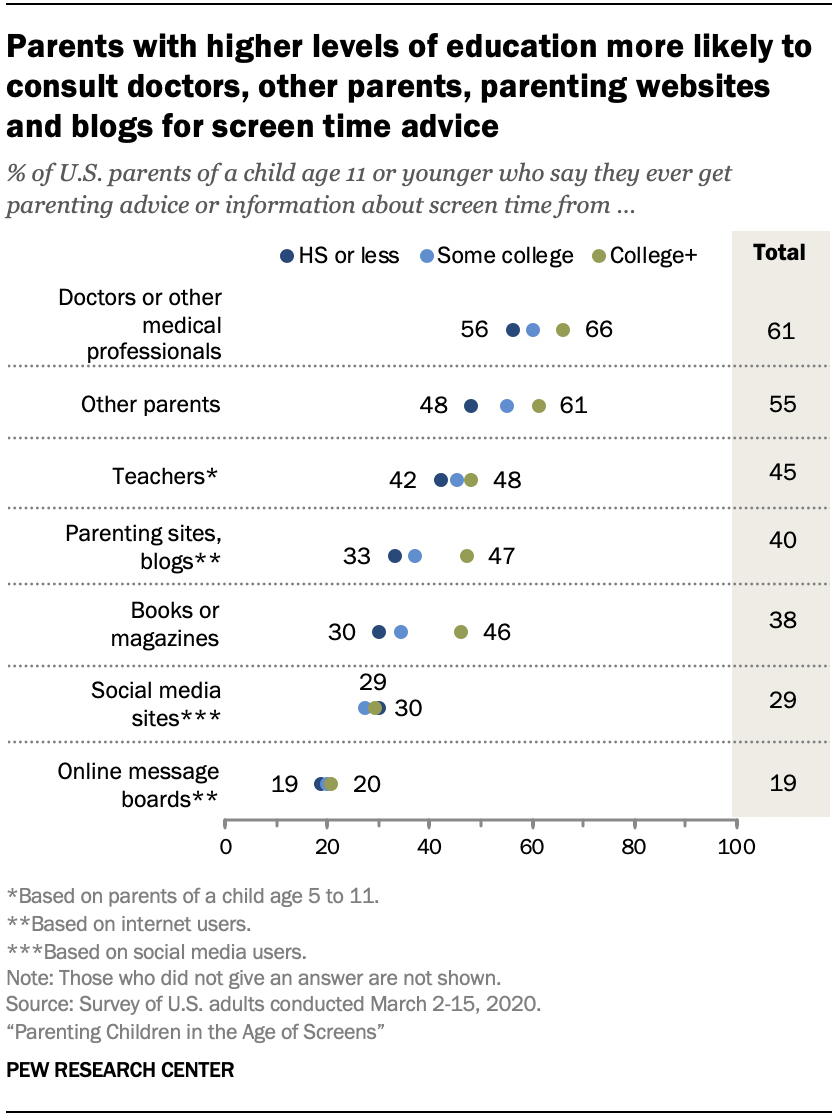
Those with higher levels of education are also more likely to report that they’ve gotten advice or information about screen time from many of these sources, compared with parents with lower levels of education. For instance, parents with a college education or more (66%) are more likely to have gotten parenting advice about screen time from doctors or other medical professionals, compared with parents who have a high school diploma or less (56%). College-educated parents are also more likely to get information from other parents and books or magazines. College-educated parents of a child in this age range who use the internet are also more likely to get information or advice about screen time from parenting sites and blogs.




